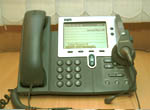
IVR stands for Interactive Voice Response, and represents software applications accessible from a telephone. Simply put, an IVR system lets callers obtain, exchange, or input information with a computer via touch-tone phone without a human intermediary. IVR systems automate the input and retrieval of information. IVR systems are perfect for businesses looking to Boost their productivity and achieve cost savings. Telnet uses innovative IVR solutions to supply its customers with easy-to-use interactive voice response applications.
IVR systems provide the basic software which allows the use of voice self services. In contrast to assisted services, which require the active involvement of a call center agent, IVR systems will pre-qualify the caller. This can be used to relieve the agent or to create a fully automated voice application. At the same time, they form the basis for call-center independent value added services such as ring tone downloads location-based services, lotteries or contests. IVR’s provide customers with 24-hour a day, 7-day a week access to business information and various services through a simple touch-tone telephone.
Below are just a few of the Industries were IVR application technologies are used.
Financial Industry: Tele Banking Solution, Mutual Funds, Credit Card Account information, Stock Trading, Financial Bank Transaction.
Call Centers: Call center employee screening, Customer satisfaction surveys, Client survey/questionnaire administration, Panel data collection.
Corporate Organization: Order entry and status, Training center, Automated Attendant, Call Centers
Education: Course Registration, Student Registration
Entertainment/Sports: Ticket Sales, Sports Schedule, Interactive TV, News Clipping
Government Organization: Vehicle Registration, Tax Office, Ticket Citation Payment
Health Care Organization: Appointments with Doctors, Clinical research surveys, Bed Checking, Time and attendance verification, Home Care Check-in
Manufacturing Company: Certification and Testing, Component availability, Order Entry and Status
Telephone Company: Third Party Verification, Conferencing, Cellular Feature Activation, Cellular Roaming, Line Testing
Transportation: Airline Fly Status, Airline Scheduling, Shipping line global checking
Retail: Dealer or Store Locator, Order and shipping tracking, Directory Assistance, Order Processing, Market Research (surveys and polls), order entry transactions
Telemarketing: Automated Dialers
IVR technology can support analog and digital telephone systems, although the latter can process many more calls at the same time. The voice board that processes each call has only between 2 and 24 ports in analog systems, but between 30 and thousands of ports when digital. Since the number of ports determines the number of simultaneous calls the system can handle, an analog system can only process a maximum of 24 calls at any given time.
Requirements for IVR Technology
1. Easy telephone access for clients
2. Affordable telephone charges for the client or MFI
3. Centrally-stored data accessible to the call flow application
4. Frequent data updates so clients can access accurate account information
5. Secured databases to prevent unauthorized phone-based access
Now a days IVR technology makes phone a powerful business tool for Organization, the simple telephone instrument becomes a powerful input/output device through which all kinds of transactions can be performed with assured security and data integrity.![]()
Monday, February 12, 2007
IVR Technologies are perfect for businesses looking to boost their productivity and achieve cost savings.
Posted by
Maria Richards
at
9:49 AM
![]()
Subscribe to:
Post Comments (Atom)


1 comment:
One god knows!
Post a Comment